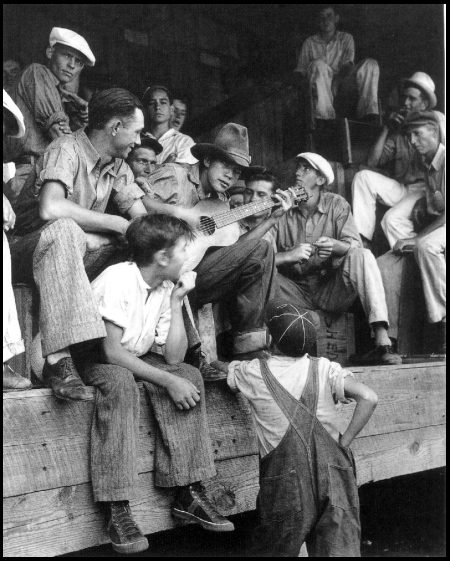|
"A good snapshot stops a moment
from running away."
Pulitzer
Prize winning author Eudora Welty started her career as a
photographer who made images of Depression-era America for
President Franklin Roosevelt's Works Progress Administration,
the agency formed to provide work for poor folks in this time.
Her heart-wrenching depictions of small-town Mississippi brought
her international acclaim, as Welty sensitively captured the
pride she saw among even the poorest people. She published
pictures of
Mississippians washing laundry by hand, tending a bootleg
still and slaughtering hogs.

image from
olemiss.edu
"It
was before self-consciousness had come into the relationship
or suspicion. That's why the experience couldn't be repeated
today, anywhere."
Welty
once said that her quest in photography, as in fiction, was
“not to point the finger in judgment but to part a curtain,
that invisible shadow that falls
between people, the veil of indifference to each other’s
presence, each other’s wonder, each other’s human
plight.”
Born in
Jackson, Mississippi on April 13, 1909, Eudora Welty was influenced
by her father's love of the camera from an early age. She
remained a "visual minded person" and employed this
skill in her writing. Welty once called herself "a natural
observer."

image from
olemiss.edu
"To
me the details tell everything. One detail can tell more than
any descriptive passage in general, you know. That's the way
my eye sees, so I just use it."
Welty
attended Mississippi University for Women, later graduating
from the University of Wisconsin and doing postgraduate work
at Columbia University in New York. After college she lived
almost all her life in the home her father built in the 1920s.
|
"I think perhaps a kindred impulse made me attempt two
unrelated things - an inquiring nature and a wish to respond
to what I saw and to what I felt about things, by something
I produced or did."
Welty
quit taking pictures after leaving her Rolleiflex camera on
a subway bench in Paris. "I punished myself. I didn't
deserve a camera after that. I was so crushed, and by then
cameras were much more expensive and of course now they are
out of sight."
Her photographs
were exhibited in New York in l936 and l937 and at the Museum
of Modern Art in l973. Several of books of her photography
have been published including One
Time, One Place, a book of 100 black-and-white photographs
published in 1971, focused exclusively on Welty's Depression-era
pictures. A 1989 book, Eudora Welty Photographs, features
more than 200 pictures, some taken on her travels around the
world.
She never
married and dedicated her life to her work. Welty died of
pneumonia this summer, July 23, 2001, at the age of 92. I
read that her doctor had to post a sign on her door turning
away fans seeking autographs. Welty added a handwritten apology,
but it was reportedly taken as a souvenir.

portraits courtesy Mississippi Department
of Archives and History
If you
are a fan of Welty's, check out the Eudora
Welty Newsletter established by William McDonald in 1977
at the University of Toledo. The newsletter and website is
"tool of scholarship, information, and homage to one
of America's most beloved writers (and photographers), Eudora
Welty." The site has evolved to include bibliographic
references to her works, textual analyses, news and queries
about Eudora Welty and her works, and checklists of scholarship.
She is
currently featured in the exhibit Faces and Stories: Photographs
by Curt Richter at the Mississippi Museum of Art. The show
presents black-and-white portraits of Southern authors and
runs from November 10, 2001 – January 13, 2002.
And in
case you were wondering, the popular Eudora
e-mail program is named after her, inspired by her short
story "Why I Live at the P.O."
Check
out an interview
with Welty on The New York Times online taken from the
in intro to her book "Photographs."
|
